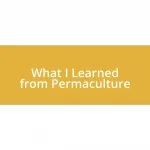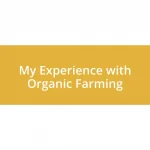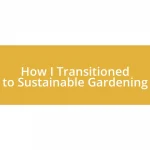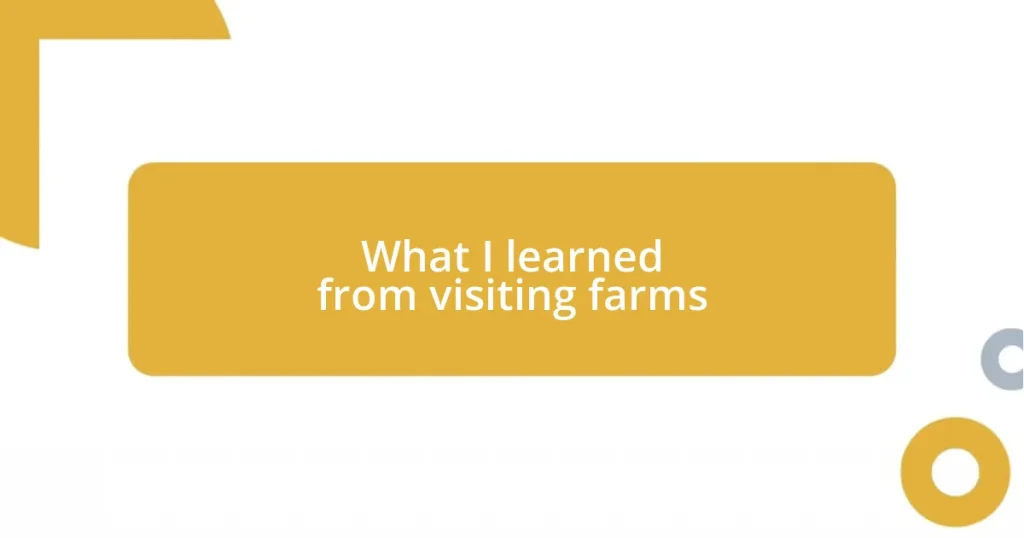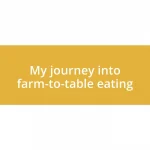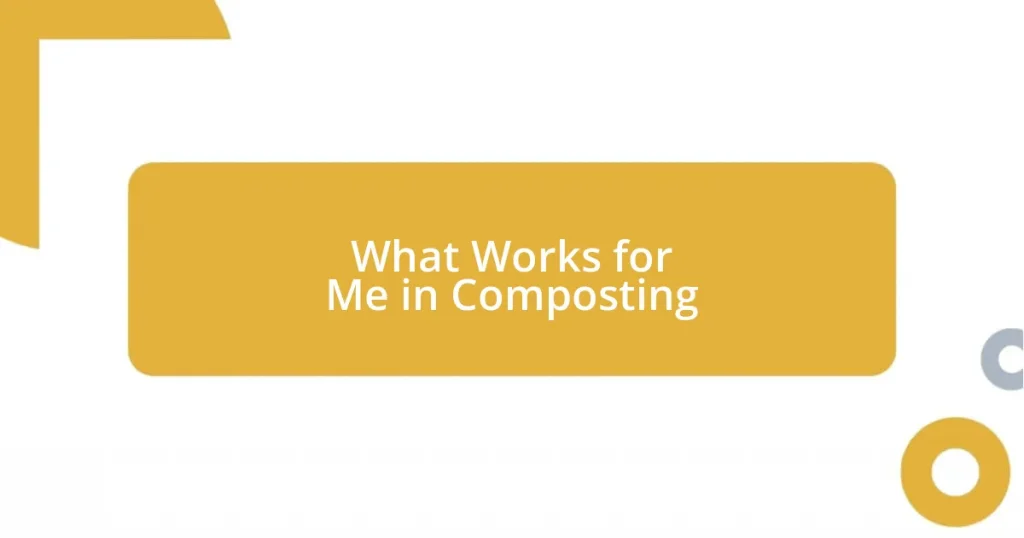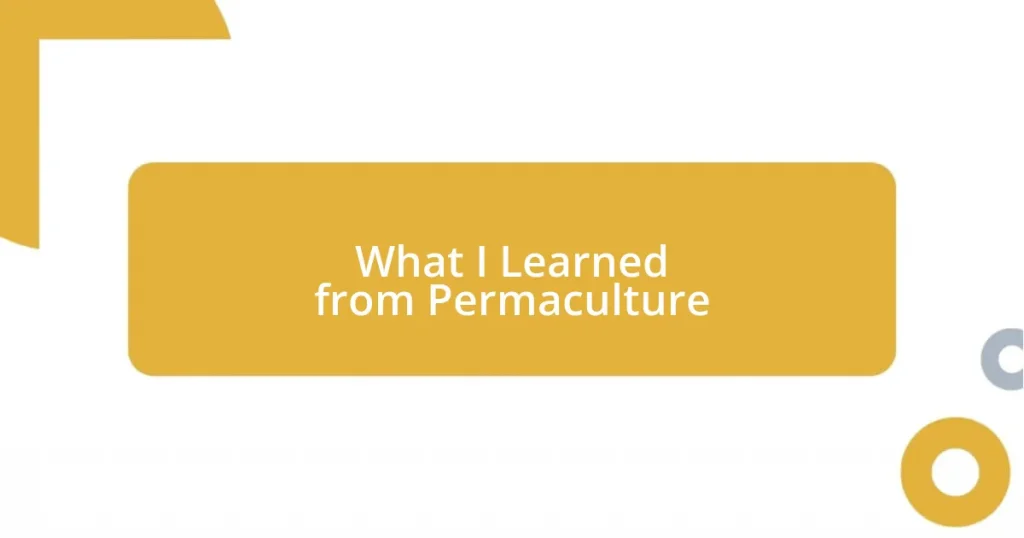Key takeaways:
- Inspired by a conversation on sustainable farming, the author reflects on the deep connection between food and the environment.
- Hands-on farm activities foster appreciation for the hard work and dedication behind food production.
- Learning about sustainable practices like permaculture and organic fertilizers highlights the importance of environmental stewardship in agriculture.
- Supporting local farms through farmer’s markets and gardening strengthens community ties and promotes sustainable food sources.
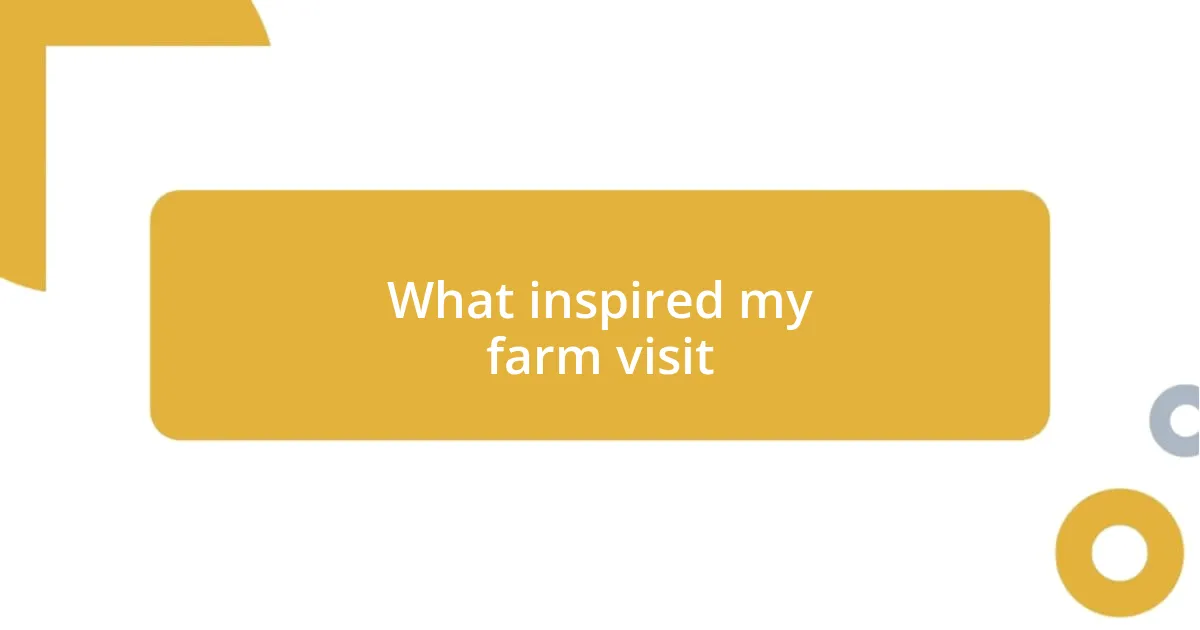
What inspired my farm visit
One sunny afternoon, while sipping fresh apple cider at a local market, I overheard a couple passionately discussing sustainable farming practices. Their enthusiasm was infectious, and I found myself wondering, what does it take to cultivate food with such care and respect for the environment? That conversation pushed me to explore the roots—literally and metaphorically—of where our food comes from.
There’s something incredibly grounding about being surrounded by nature, and I recall a particular moment when I stood amidst rows of vibrant vegetable crops, the earth fragrant and alive. The undeniable connection between the land and our meals struck me deeply; I thought, how often do we truly appreciate this link? Witnessing the hard work of farmers nurtured a newfound respect for the food I consume daily.
Another driving force behind my farm visit was my childhood memories of my grandparents’ small garden. I often helped them pull weeds or pick fresh tomatoes, and those moments were filled with laughter and the simple joy of nurturing life through our hands. This nostalgia compelled me to revisit that comforting sentiment, sparking a desire to reconnect with those roots and learn about modern agricultural efforts that echo those cherished experiences.
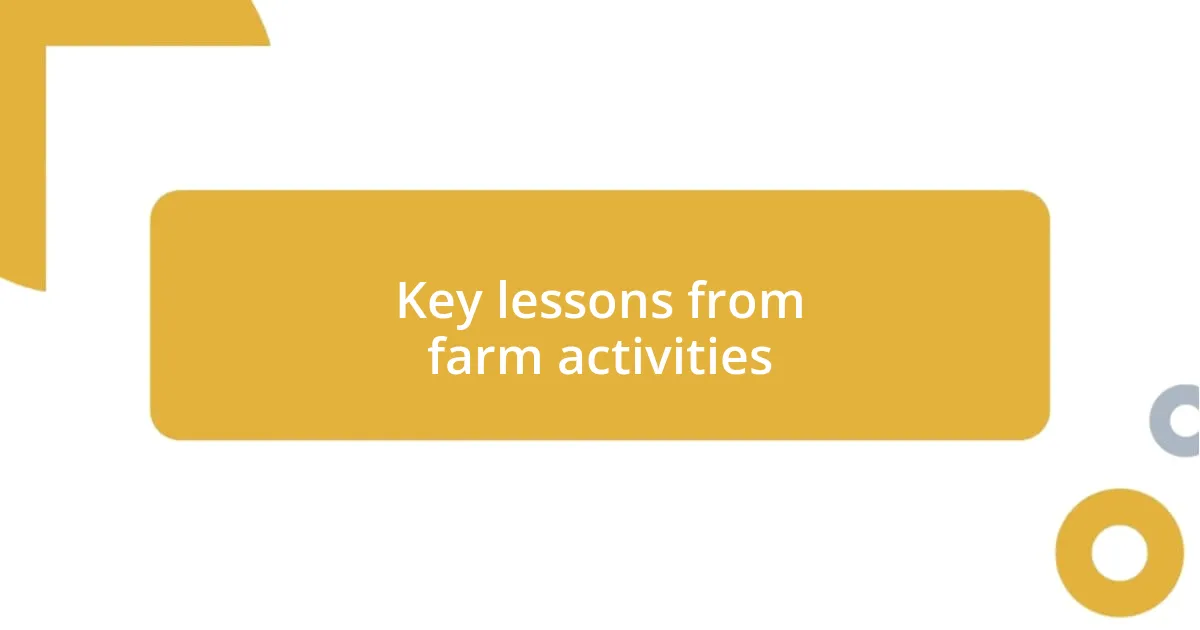
Key lessons from farm activities
Engaging in farm activities taught me just how much effort and patience go into food production. As I gathered eggs from the coop one morning, I felt a rush of gratitude for that simple, yet vital task. Each egg symbolized the dedication of the hens and the farmers. I realized that it’s easy to take for granted the daily labor that nourishes us.
Here are some key lessons I walked away with:
- Appreciation for Hard Work: My hands were stained with soil, reminding me how labor-intensive farming is.
- Sustainable Practices Matter: I learned about crop rotation and natural pest control, realizing their importance for environmental health.
- Community Connection: Meeting local farmers highlighted the sense of community that often goes unnoticed; their passion is contagious.
- Seasonal Awareness: I now understand why certain produce is fresh at different times of the year, fostering a respect for nature’s rhythms.
- Mindfulness of Food Choices: Each meal is a product of someone’s labor, making me more conscious about my consumption habits.
During a hands-on workshop, I had the chance to plant seeds myself. Feeling the cool, damp earth beneath my fingers sparked a sense of responsibility. It was a powerful reminder of the life cycle of food and the nourishment it offers, which goes beyond just filling our stomachs. Each seed I planted felt like a promise.
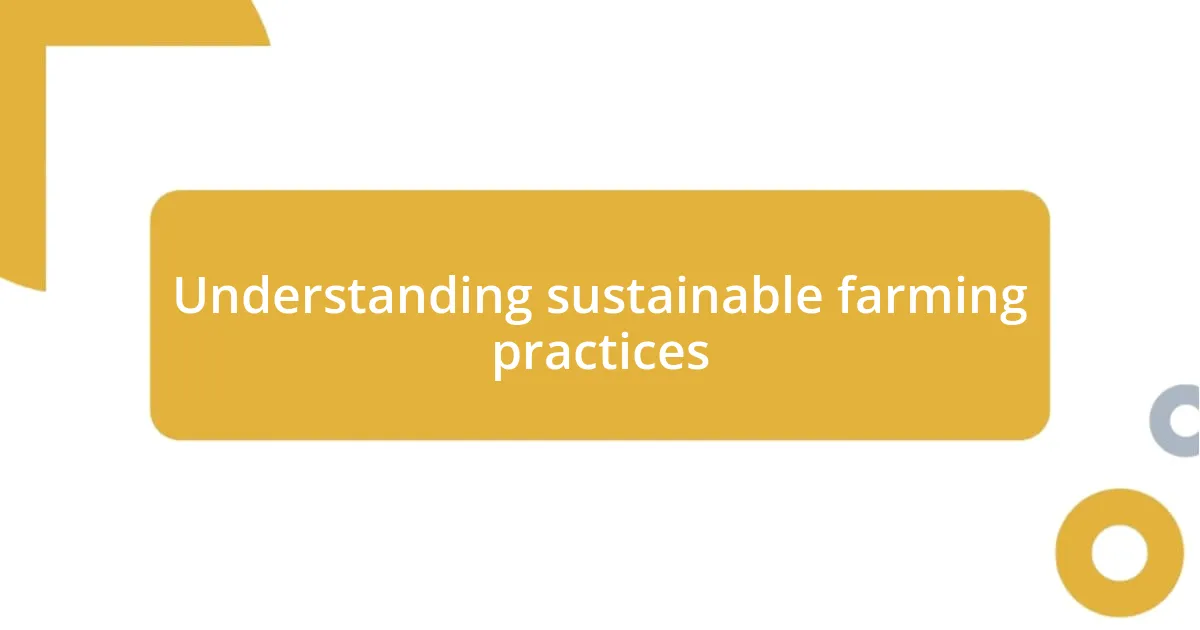
Understanding sustainable farming practices
Understanding sustainable farming practices is a journey that opened my eyes to the delicate balance farmers maintain with nature. During my visit, I learned about techniques like permaculture, which embraces biodiversity and mimics natural ecosystems. I recall watching a farmer explain how planting various crops together can enhance soil health and reduce pests naturally. Hearing her passion as she spoke about nurturing the land made me reflect on how we often overlook the intricate relationships in our own environment.
As I spent time on the farm, I couldn’t help but feel amazed by the use of organic fertilizers and cover crops. One evening, while we shared tea made from herbs grown on-site, I realized that these practices not only promote soil fertility but also help sequester carbon from the atmosphere. It felt empowering to witness how these choices could contribute to a larger fight against climate change. I left with a firm belief that sustainable farming is a hopeful path toward a healthier planet for generations to come.
Furthermore, I was struck by the concept of sustainable water management. Standing near a rainwater catchment system, I learned about its role in conserving precious resources. The farmer shared stories about drought years and how they adapted their methods accordingly. It was a stark reminder of our responsibility to protect water supplies. As I looked over the fields, I couldn’t help but feel that sustainable farming is more than just a technique—it’s a philosophy rooted in respect for the earth.
| Sustainable Practice | Description |
|---|---|
| Permaculture | A design approach that mimics natural ecosystems and fosters biodiversity. |
| Organic Fertilizers | Natural fertilizers that enhance soil health without harmful chemicals. |
| Cover Crops | Crops planted to improve soil quality and prevent erosion. |
| Rainwater Harvesting | A method of collecting rainwater for irrigation and conservation. |
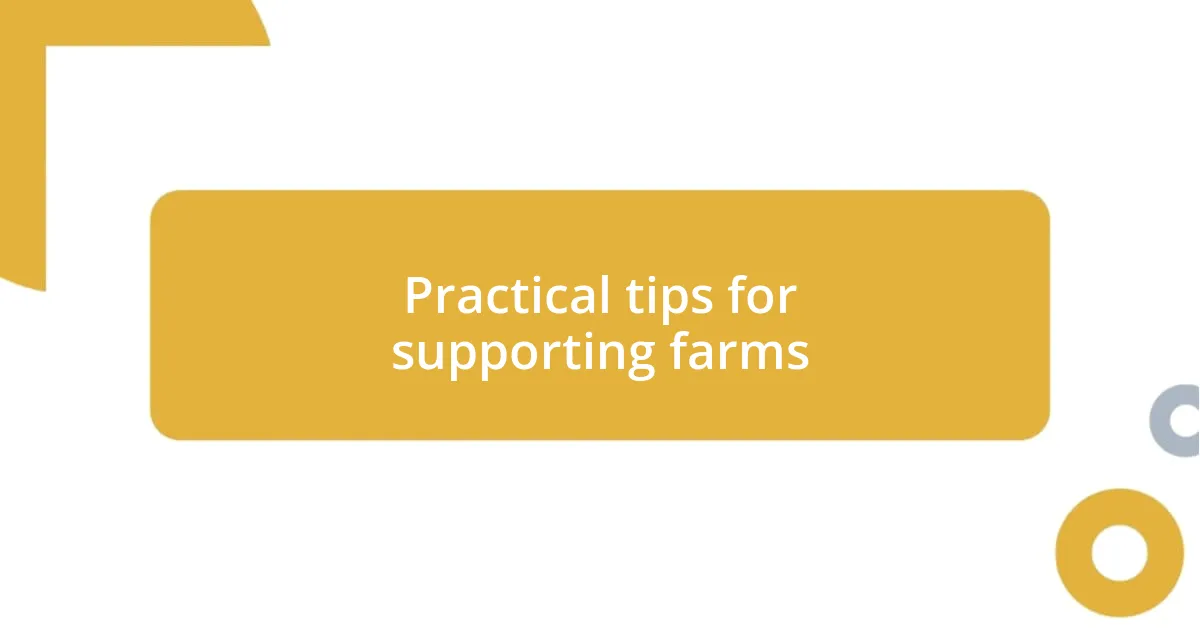
Practical tips for supporting farms
Supporting farms doesn’t have to be overwhelming; small, consistent actions can make a big difference. One summer, I decided to frequent my local farmer’s market instead of the supermarket. Walking through those stalls, I felt a sense of community as I met farmers who poured their hearts into their work. Buying directly from them not only supports their livelihoods but also fosters a connection that’s easily lost in the aisles of big-box stores. Have you experienced that sense of connection by shopping locally?
Another practical tip is to consider starting your own garden, even if it’s just a few herbs on the windowsill. I remember my excitement when I planted basil and tomatoes in pots during the pandemic. Tending to those plants brought me closer to the food I consumed and encouraged a greater appreciation for the work farmers do. Even small gardening efforts can inspire others, creating a ripple effect in your community. Isn’t it amazing how nurturing a single seed can deepen our relationship with our food sources?
Lastly, I encourage you to become an advocate for sustainable practices and policies. Attend local meetings, support initiatives that promote environmentally friendly agriculture, or simply share information with your friends. I once spoke at a community event about the importance of crop rotation and sustainable farming techniques. The conversations that followed opened my eyes to how sharing knowledge can motivate others to take action. We can create change together—don’t you think every voice has the power to inspire?
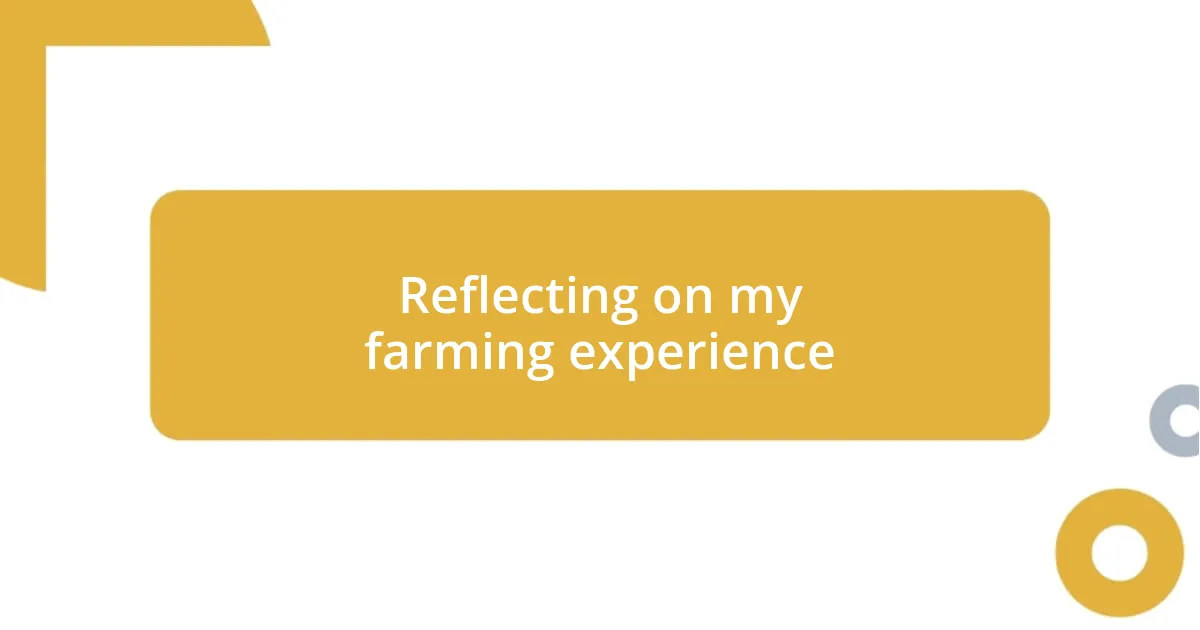
Reflecting on my farming experience
Reflecting on my farming experience truly transformed my perception of food production. I vividly remember the day I helped plant seeds in a community garden, feeling the warm earth between my fingers. It was exhilarating to be part of something bigger, forging a connection not just with the plants, but with the farmers who work tirelessly to bring food to our tables. Have you ever felt that deep satisfaction from working the land, even just for a moment?
As I watched the crops grow, I began to appreciate the patience and commitment required in farming. There was a day when we spotted pests nibbling on the lettuce. Instead of reaching for pesticides, the farmer calmly explained how we could use beneficial insects to take care of the problem naturally. This approach piqued my curiosity, inspiring me to explore holistic solutions in my own life. It made me realize that when we nurture our environments thoughtfully, we can find balance in unexpected ways. How often do we overlook these natural remedies in our pursuit of quick fixes?
One evening, while grabbing dinner from a farm-to-table restaurant, I couldn’t shake the feeling that I was still connected to that garden. The dishes featured vibrant, fresh ingredients sourced locally. I remember the warmth in my heart as the chef shared stories about the farmers he collaborated with. It reinforced my belief that our choices as consumers can support sustainable practices. Isn’t it fascinating how interconnected we all are, from the fields to our plates? Each visit to a farm deepened my understanding of this relationship, and I’m eager to continue exploring my role in cultivating this connection.


